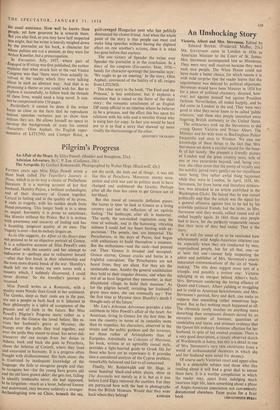Pilgrim's Progress
The Acropolis. By Gerhart Rodenwaldt. Photographed by Walter Hege. (Blackwell, 42s.) FIFTEEN years ago Miss Dilys Powell wrote a short book called The Traveller's Journey is Done, which is in its way a classic of Philhellenic literature. It is a moving account of her first husband, Humfry Payne, a brilliant archaeologist, and of their discovery of Greece together. Lyrical In feeling and in the quality of its prose, it ends in tragedy, with his sudden death from blood-poisoning. This longer book is in a sense its sequel. Inevitably it is prone to anticlimax, like Hamlet without the Prince. But it is written with awareness and sincerity of feeling and has a haunting, poignant quality of its own. The tragedy is over—but its melody lingers on.
As its title suggests, An Affair of the Heart does not pretend to be an objective portrait of Greece. It is a subjective account of Miss Powell's own love affair with the country and her attempt to rediscover it—perhaps also to rediscover herself —after that first break in their relationship and the even more drastic break of the war. 'Humfry's death left me to make my own terms with a country which, I suddenly discovered, I could never divorce.' So the traveller's journey is resumed.
Miss Powell writes as a Romantic, with a quality more Nordic than Greek in her sentiment. The Greeks, deep as their roots are in the past, are not a people to hark back to it. Inherent in their philosophy is a spirit of acceptance of the Present and of faith in the future. But Miss Powell's Pilgrim's Progress starts rather as a search for the Greece she loved before. She re- visits her husband's grave at Mycense; she tramps over the paths they trod together, and over the paths they meant to tread, but never did; Whenever she can escape from her duties in Athens, back and back she goes to Perachora, above the Isthmus of Corinth, where they lived and excavated in harmony. It is a progress often fraught with disillusionment. She feels alone; she is frustrated by inadequate knowledge of the language; she fails to recognise people and they to recognise her—for the young have grown old and the old have grown older; she gets lost, failing to identify landmarks never, she had supposed, to be forgotten—much as a lover, believed known and understood, may become suddenly a stranger, Aschwologising now on Chios, beneath the sea,
not the earth, she feels out of things : it was not like this at Perachora. Moreover, enemy occu- pation and civil war and its politics seem to have changed and embittered the Greeks. Perhaps after all the time has come to get Greece out of her blood.
But this mood of romantic deflation passes. She learns in time `to look at Greece as a living country and not the reflection of an egoistic feeling.' The landscape, after all, is immortal : 'The earth, the sun-sucked vegetation sang the tune of solitude, and in the humming, vibrating stillness I could feel my heart beating with ex- pectation.' The people, too, are immortal. The Perachorans, in the days of Payne, had begun with enthusiasm to build themselves a museum. But the enthusiasm—and the cash—had petered out. Then 'Greece is invaded and occupied; Greece starves; Greece cracks and burns in a frightful convulsion. The Perachorans are not heard from; they are silent. For they are the unalterable ones. Amidst the general annihilation they hold to their singular dreams; and when the rest of us have forgotten they remember, in their dilapidated village, to build their museum.' As for the pilgrim herself, revisiting her husband's grave once more, she can eventually say : 'For the first time at Mycenx since Humfry's death thought only of the future.'
Mr. Lee's Athenian Adventure provides a nice antithesis to Miss Powell's affair of the heart. An American, living in Greece for the first time, he sees the country in terms of its comedies more than its tragedies; his characters, observed in the • streets and the public gardens and the tavernas, are those rather of Aristophanes than of Euripides. Admittedly no Colossus of Maroussi, his book, written in an agreebly casual style, provides a light-hearted guide to Greek life for those who have yet to experience it. It provides also a considered analysis of the Cyprus problem, remarkably balanced and fair to all concerned.
Finally, Mr. Rodenwaldt and Mr. Hege, in some hundred black-and-white plates, show us The Acropolis not merely as it is, but as it was before Lord Elgin removed the marbles. For they are portrayed here with the best in photographs from the British Museum. Would that they were






































 Previous page
Previous page